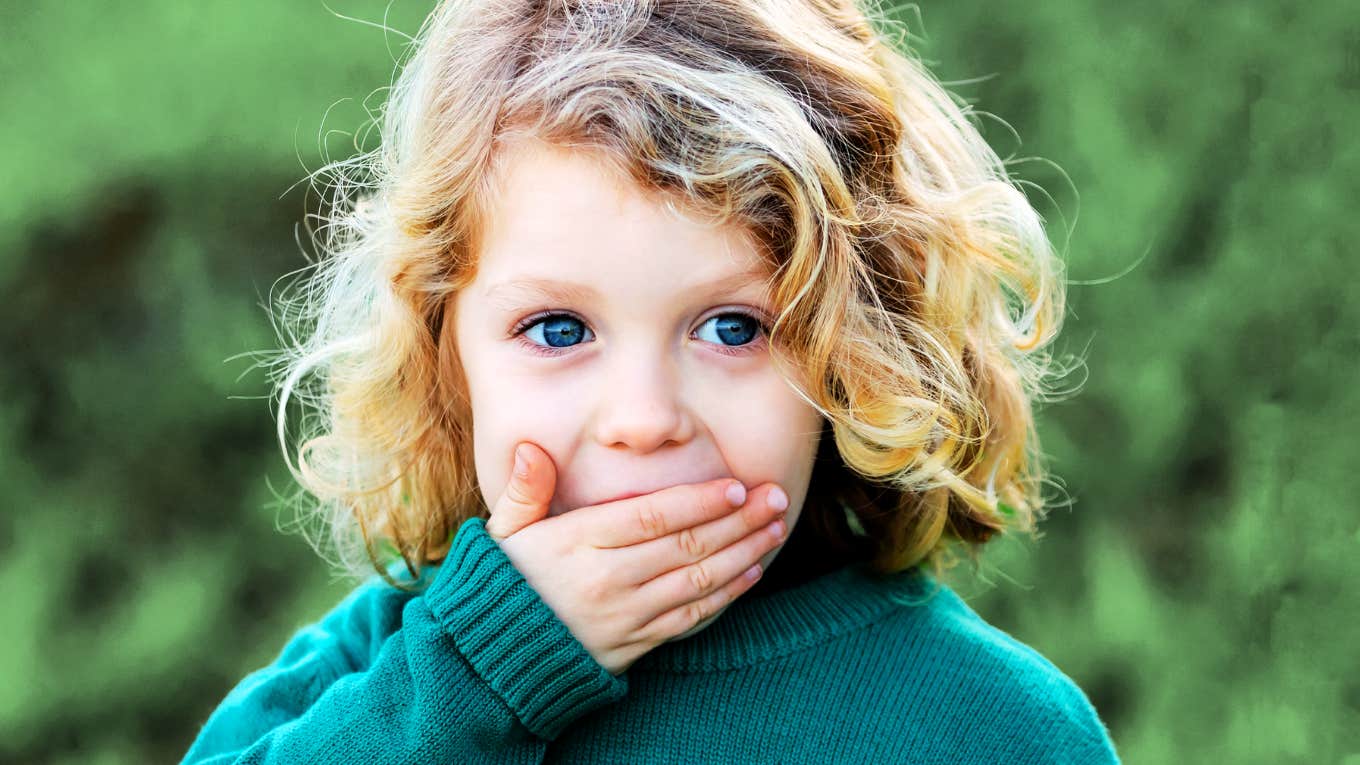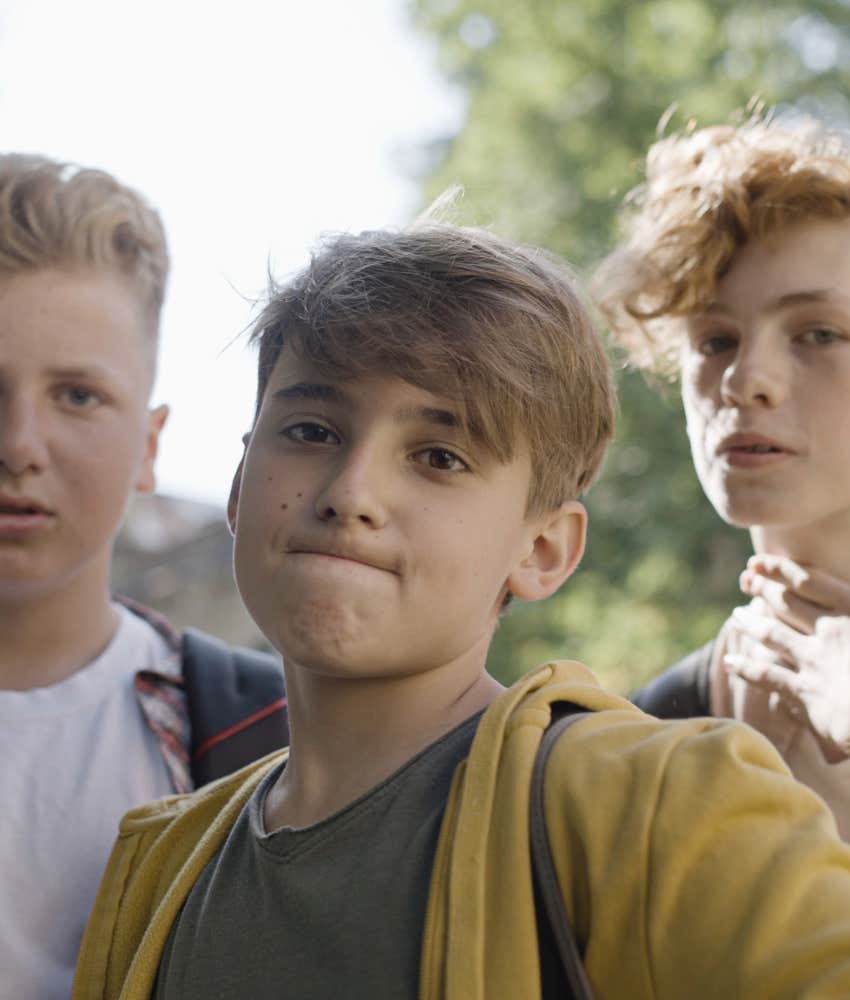I'm A Liberal Parent But Even I Don't Let My Kids Say These Words
Words are power regardless of whose mouth speaks them.
 Jose Manuel Gelpi | Canva
Jose Manuel Gelpi | Canva I keep hearing about parents who let their young kids swear, and I'm a little perplexed by it. Often, they are Liberal, compassionate and well-educated. They seem unbothered by the fact that some people might be offended, despite worrying about offending others overall.
When my sons were small, I was often approached by other parents about how polite my sons are, as if they're shocked. I finally got up the nerve to ask one of these moms why.
"Well," she said, "You are just so outspoken! And you're all about feminism and politics."
That makes me wonder, how did we get to the place where progressive families set so few limits for our kids?
Five reasons I don't let me young kids swear, even as a liberal:
1. Swearing gets kids in trouble in school, sports, and other clubs/groups
Most kids are not mature enough to know when they should swear and when they shouldn't. This is especially true with little kids, whose ability to think their actions through ahead of time is naturally limited.
On top of that, our kids naturally mimic their family's speech patterns and word choices. So why would I set my kid up for a visit to the principal's office or a mark on "the naughty board" by normalizing swear words?
We should build up our kids' self-esteem, not set them up to be labeled as "the naughty kid".
2. It can be hard for kids to sort swear words from harmful words
 SynthEx via Shutterstock
SynthEx via Shutterstock
In our house, there are some "bad words" we never, ever use. When these words come up in music or movies, we talk about why they were used (sometimes appropriate in context, sometimes not) and what words we can use instead. These words are less "naughty" and more offensive. Slurs, not swears.
My kids saw how confusing these rules can be when a middle schooler referred to their math teacher by using the derogatory word that starts with "B" in front of his mom. His mom was shocked at his language, and the boy replied with, "You don't care if I swear, as long as I'm not in school!"
She nodded and let it go. But isn't calling a teacher a derogatory word something more than just swearing?
But letting your kid say some "bad" words (swears) and not others (slurs) might just be too complex at a young age. So, while I find it important to explaint the difference between a naughty word and a hurtful word, I find it more practical to make it clear they aren't allowed to say either.
Spend time around a large group of middle school boys who don't think a parent is listening, and you'll likely be shocked by their casual use of slurs that you thought were long gone! I suspect this is because nobody is distinguishing for them "bad words" from "harmful words".
3. Swearing can be offensive to other people
This is where I get super confused by progressive families who let their kids "take the Lord's name in vain", as my mother used to say. Are they not worried about their child being offensive toward someone else's religion?
Sure, Christians aren't exactly a persecuted class here in the United States, but I still think we can respect the sanctity of someone else's god. As I mentioned in point number one, it can be hard for a small child to know when they can say "Jesus Christ!" or "Oh my GOD"
4. Swearing limits your kids' social circle
 Monkey Business Images via Shutterstock
Monkey Business Images via Shutterstock
I want my kids to be able to be friends with any kid they think is nice and fun, and who treats other people well. If my son is in the habit of swearing, there are going to be a lot of parents who won't want to have him over to play, or who may even advise their child not to hang out with him.
As a result of my strictness, my kids have friends from a variety of religious backgrounds and faiths. I want my sons to be able to hang out with anyone they'd like to, and not have their choices limited to other families who allow swearing in their house.
No parent ever said their child couldn't hang out with someone because they don't swear enough. But we all know that the reverse happens all the time.
5. Swearing can be intrusive and threatening
I'm raising boys and I've been teaching them throughout their lives to respect the space around them and not intrude upon other people's space or comfort. We have a code word, "Up and around", which means "look up, look around you, and observe the people and energy nearby."
Swearing can escalate situations that don't need to be hostile, regardless of your gender. For boys and men, especially, this level of threat can be especially multiplied, scaring others or even putting yourself in danger.
The rules haven't changed now that I'm also raising a girl, even though the use of swear words may be perceived differently.
Regardless of gender, I want my kids to see that swearing in public often makes other people uncomfortable, and can even make them feel unsafe or put them in danger.
There are some clever workarounds for allowing bad words
I even have a friend who lets her kids swear, in a very clever way. Here are her rules:
They may say one swear word a day, and it can only be in their own house or car. The swear word may not be used against any other person, and may not be a slur. I think that's pretty clever. It teaches self-control!
She's also teaching them to think about their word choices, context, and if what they say hurts someone else.
Her kids never swear anymore. Her son said it's because he's always "saving up" his swear word in case something really bad happens.
I'm not certain my kids will always be polite. They are good boys, but far from perfect. And there are times I don't want them to be polite, especially as they get older.
Like if they're standing up for someone else, like the grown-ups holding signs around them at the Women's March with words they're not allowed to say. We talked about how context mattered there and why it was okay for those women to reclaim some words.
I want them to understand that sometimes we raise our voices and are not "nice" when important things are on the line. But there is a time and a place.
Right now, they have limits and an expectation to speak respectfully. And I think it's high time other parents get on board.
Joanna Schroeder is a parenting writer and media critic whose writing has appeared in The New York Times, The Boston Globe, and more. She is co-author of the upcoming book Talk To Your Boys: 16 Conversations to Help Tweens and Teens Grow into Confident, Caring Young Men.

